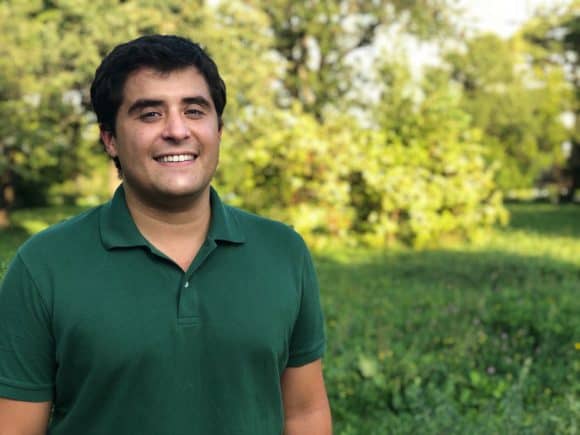
Julian Hunt – personal archive.
Julian Hunt is a postdoc at IIASA and part of the Brazilian Federal Agency for Support and Evaluation of Graduate Education (CAPES) scheme.
My postdoctoral research consists of looking at the world potential and costs of storing energy and water with large-scale pumped-storage plants. This consists of developing computational models using world topographical and hydrological data to develop all possible projects in the world. The results from my research could then be used by countries to analyze the viability of building seasonal pumped-storage for short, medium, and long-term energy storage needs and to improve the water management of the country.
I first heard about IIASA at the Vienna Energy Forum in 2010, when I was doing an internship at UNIDO. I got the impression that IIASA was a major contributor to the science that supports major claims by the UN. This led me to start reading about IIASA’s projects and follow its research. I did not think twice when I received an invitation to apply for the IIASA-CAPES fellowship, which gave me a chance to join the institute and develop my own high impact research. One thing that might stop Brazilian people from applying for this scholarship is because the native language in Austria is German. However, IIASA’s working language is English and in Vienna most people speak English.
IIASA focuses on applied and high impact research at a global scale. Prior to my experience at IIASA, I used to develop new technologies looking only at one or a few cases studies. This limited the research to a small readership, which would think that the technology could only be implemented in one location. With the experience I had at IIASA, I learned to combine my technological expertise with computer modelling and Geographic Information System in most of my work. This considerably increased the readership and impact of my research, and citations of my papers.
Working at IIASA you can focus only on your research. Normally when doing research at universities you might have to give lectures and supervise students. This reduces the important focus on research. At IIASA the main activities are to research, publish articles and scientific reports, present your work at conferences, collaborate with other research institutes, develop projects and so on. The main activities of a researcher. Similarly to universities, there is always finger food (free lunch) available, but the quality is much better.
IIASA is located close to Vienna, which is a beautiful, lively, and affordable and city. Vienna was voted the best city to live in the world and I agree with this. Another important aspect is the social life. IIASA has a very active social life, which includes regular events and parties, different societies (music club, running club), an active Staff Association (STAC) and the possibility of making friends from around the world. Becoming IIASA alumni will also open doors for your future. For example, the Young Scientists Summer Program (YSSP), brings around 50 of the best researchers in the world every year to IIASA. This results in a large network of IIASA alumni researchers.
I highly recommend that researchers, fluent in English, who want to give a huge boost to their research career, learn a lot of valuable methodologies, solve holistic and complex problems, make good friends, and increase their network should apply for a research position at IIASA.
Applications for the 2019 IIASA-CAPES Doctorate Sandwich Program and Postdoctoral Fellowship Program opened on 1 September 2018 and will run until 15 October 2018. Candidates have to apply to both CAPES (on the CAPES website) and IIASA. Successful applicants will be informed of the selection results by mid-December 2018. Selected candidates are expected to take up their position at IIASA between March and October 2019.
Note: This article gives the views of the author, and not the position of the Nexus blog, nor of the International Institute for Applied Systems Analysis.

You must be logged in to post a comment.